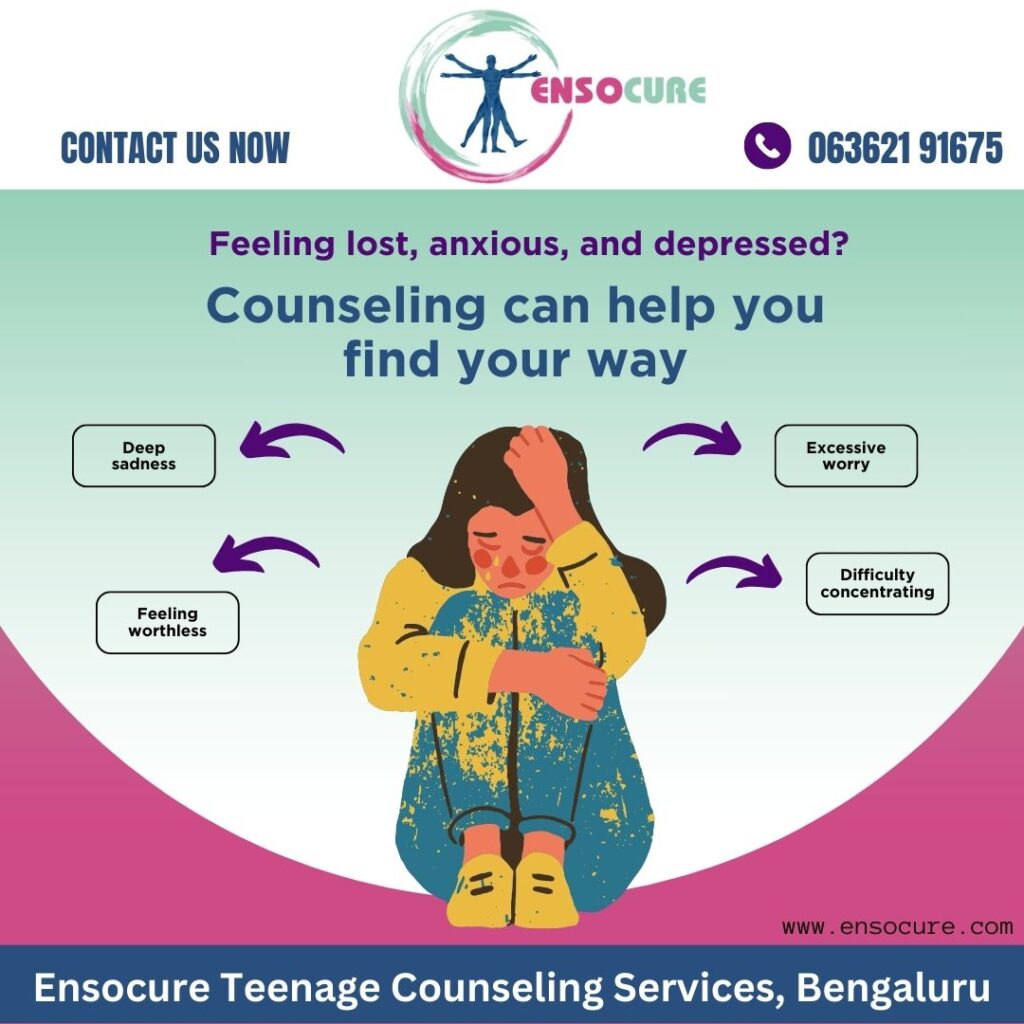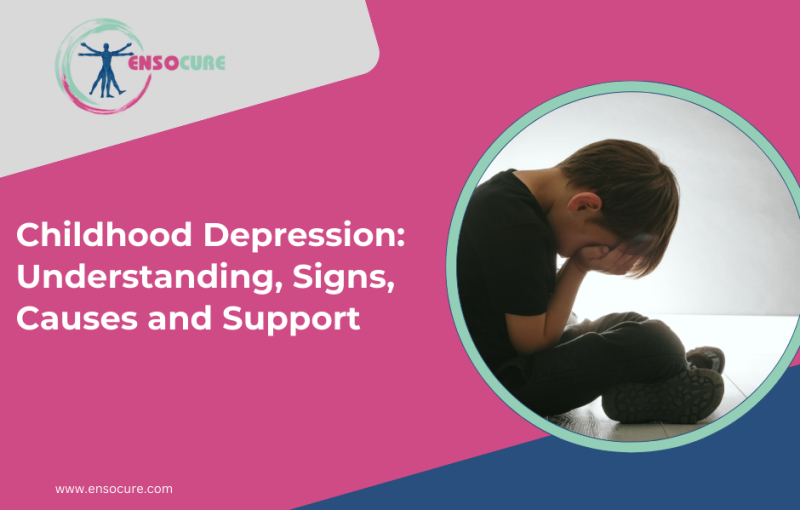There was a time when childhood was a time of innocence and carefree joy. Today, however, times are different. The evolution of technology, competitive academics, peer pressure, and social media all contribute to adolescent and childhood depression. Parental pressure on young kids to excel even in primary school or exhibit skills to showcase in social circles is all taking a toll on our kids. Childhood depression and Anxiety are prevailing mental health disorders in young people today, and only acknowledgement, understanding and professional help can address the issue before it escalates into far worse conditions.
Mental Health in India
Mental health in young India especially is a cause for concern. The country has the world’s largest adolescent population of approximately 243 million, but the statistics on mental health are alarming. According to one study, 6.5% of the community and 23.3% of school children and adolescents have psychiatric disorders. In addition, it reported how the National Mental Health Survey (2015–2016) found a 7% prevalence of psychiatric disorders in 13–17 years and was nearly equal among both genders. Unfortunately, the impact of the severity of mental health problems in Indian children is lost in Indian society, not realizing how childhood security, and addressing mental concerns in childhood is the key to a child’s mental health as an adult.
What is Childhood Depression?
Depression in children can become lengthy periods of unhappiness, irritability, unexplained sadness, and lack of interest in normal activities. A child might not even show interest in playing with friends and often appear annoyed. Unfortunately, depressive behaviour in children often goes undiagnosed, and it is not uncommon for parents to feel as if their child is simply acting up. The cardinal mistake parents make is thinking their child has nothing to be depressed about.
Childhood depression can affect kids of any age and differs greatly from common mood swings, which last for brief periods. Depression in children impacts how kids interact with friends, other children, and family. It manifests over longer periods and prevents children from participating in school sports, family get-togethers, normal behaviour, and activities.
Recognizing Childhood Depression: Signs and Symptoms
The signs of childhood depression can manifest differently in children compared to adults. Careful monitoring of a child’s behaviour is essential to identify signs that a child may struggle with Depression. Common symptoms include:
- Sadness, irritability, grumpiness
- A low mood that does not go away
- Fatigue, tiredness most of the time
- Loss of appetite
- Sleeping problems
- Social withdrawal and lack of interest in things they enjoy
- Physical symptoms (headaches, stomachaches)
- Poor concentration and declining school performance
- Weight changes
- Older children may also feel:
- Feelings of guilt or worthlessness
- Suicidal thoughts or self-destructive behaviours
- Indecisiveness
- Remaining aloof all the time
It needs to be noted that childhood depression can affect children of all ages, from preschoolers to teenagers. However, the signs may differ depending on age. Younger children may find it harder to deal with their emotions and struggle to express them. A younger child depressed by reasons beyond the home front might display signs of clinginess or anxiety. In contrast, adolescents might show more classic symptoms of depression like adults, such as isolation and changes in sleep patterns.
Anxiety in Children
Anxiety in young children is a common and normal part of development. It’s a natural response to various situations, such as new experiences, separation from parents or caregivers, and unfamiliar environments. Some children experience a more intense form of excessive anxiety, which persists to the point of preventing the child from leading a normal life. While small amounts of anxiety keep you safe, sometimes, it can make you feel as if things are so bad that you must drop everything and worry about it. Anxiety in children may interfere with school, home, or play activities and needs a proper diagnosis for quick management. Anxious children frequently need reassurance and security from their caregivers and parents. The condition in children might just be missed out because sometimes, anxious children may be eager to please just to ensure the presence of the adult nearby.
Signs Of Anxiety in Children: Emotional
- Separation anxiety: Being overly clingy, panicking, or tantrum at times of separation from parents can make leaving the child with others extremely challenging.
- Social Anxiety: Fear of school and other places
- Phobias: Fear of situations, going to the doctor or animals
- Fears: fear about bad things happening or the future accompanied by physical symptoms
- Inability to focus
- Always panicky, nervous, edgy
Physical Symptoms of Anxiety
- Palpitations, breathing difficulties,
- Shortness of breath, headaches or feeling faint
- Feeling fidgety, trembling, or feeling weak in the legs
- Stomach cramps, diarrhea, or frequent visits to the bathroom
- Sleep problems
- Poor appetite
- Dry mouth, excessive sweating or feeling hot.
Why Do Children Get Depressed?
Nobody can accurately identify why childhood depression happens. Sometimes, it can come out of nowhere. Depression can run in families or be due to an underlying cause or a medical condition. Depression can also occur because of social circumstances such as losing a loved one, being bullied at school, violence at home, broken families, parental neglect, learning issues, and conduct disorders, which increase the risk of Depression. Too much social media has also given rise to new-age conditions like FOMO (the fear of missing out) and sadfishing. Depression must always be diagnosed by a mental health professional who will first rule out medical conditions, if any.
Possible Causes of Depression
- Family difficulties, grief, divorce, domestic violence
- Bullying, physical, emotional, or sexual abuse
- Family history of Depression or other mental health problems
- Hormonal imbalances
- Chronic illnesses known to cause Depression
- Anemia.
- Diabetes.
- Epilepsy.
- Hypothyroidism or hyperthyroidism.
- Mononucleosis.
- Vitamin D deficiency.
Coping with Childhood Depression
Child depression should always be taken seriously because untreated and mismanaged mental health in children creates a lasting impact that never really goes away. It induces a sense of insecurity in a child growing up with the knowledge of being alone in a fight they don’t understand. The result is an insecure adult ill-equipped to meet life’s challenges due to poor self-confidence and low self-esteem. Besides the experts, parents and educators can play a major role in helping a child cope with Depression. Here are some time-tested strategies for managing childhood depression
Reassure your child
Even if a child does not want to talk to you, reassure them by showing concern and letting them know you are there for them when they need you. Encourage open communication without being judgmental; do not preach, but listen.
Encourage Your Child to Talk to People They Trust
Be active in your child’s progress at school and frequently ask teachers about your child’s behaviour and activities in school. Speaking to others helps you gain insight into your child in your absence. Moreover, please encourage your child to talk to a teacher or relative they can trust.
Create a safe environment
Foster a safe and nurturing environment where the child feels comfortable expressing their feelings and seeking help. Creating an atmosphere of positivity and compassion at home will make your child feel relaxed and secure. Tell them frequently how you love and support them.
Establish routines and positive habits
Consistent routines can provide stability and predictability, which can be reassuring for a child with Depression. Moreover, help your child stick to regular eating and sleeping habits and stay active. Physical activity and music are both great ways to boost their mood.
Keep your child engaged and physically active
Keep your child engaged with a well-structured and exciting routine that includes chores, study, entertainment, and play. Please encourage your child to engage in physical activities they enjoy because regular exercise positively impacts mood and well-being.
Monitor screen time
Excessive screen time, especially on social media, can increase feelings of isolation and inadequacy. Set limits on screen time and monitor online activities. Social media today is a well-known reason for Depression in young adolescents.
Healthy diet
Encourage healthy eating habits in your child and ensure they are given a well-balanced diet, which can contribute to improved mental health. Limit sugary and processed foods and encourage the consumption of nutritious meals.
Quality sleep
Sleep is extremely important in young children and adolescents. Children need more sleep than adults, and lack of sleep increases the risk of poor cognitive function and potential mental health issues.
Spend quality time with them.
It can never be stressed enough why a parent needs to be actively involved in their child’s life. Ask your child about their day at school, and talk to them about their likes and what they love doing. Put your phone away and keep aside distractions when spending time with your child. Listen to music together, play a board game, or simply be there physically for them.
Seek professional help
If your child’s Depression persists, you must consult a mental health professional such as a psychologist or a psychiatrist if medication is needed. In adolescents especially, the problem can graduate to matters of serious concern, so never hesitate to seek help and support.

Childhood depression is complex and can be a fleeting thing or a serious mental health disorder that requires immediate attention. In India especially, child depression is still not a very well-understood condition. Awareness, acceptance and understanding of the potential impact depression can have on child development is vital to initiate treatment and management in the early stages. Ensocure Integrated Medicine in Bengaluru operates a child care service which also involves psychotherapy services to address mental health issues in children.
Sources
NHS: Depression in children and young people
NHS: Anxiety in young children
UNICEF: Supporting children with depression, stress, and anxiety
CDC: Anxiety and Depression in Children
AACAP: Anxiety and Children

